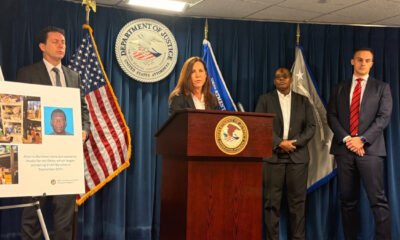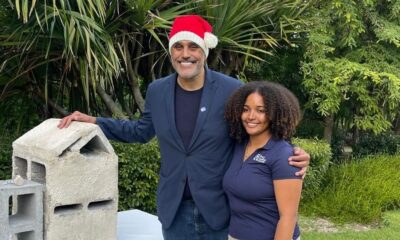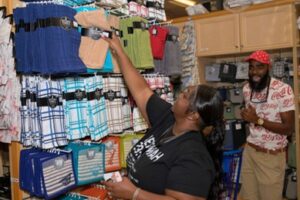Press Release
United States Attorney’s Office
Southern District of New York
USA, November 27, 2024 – Damian Williams, the United States Attorney for the Southern District of New York, and Anne Milgram, the Administrator of the U.S. Drug Enforcement Administration (“DEA”), announced the unsealing of an Indictment charging 13 defendants with cocaine importation and related weapons offenses in connection with their participation in a massive cocaine importation conspiracy enabled by corrupt Bahamian government officials, including high-ranking members of the Royal Bahamas Police Force (“RBPF”). ELVIS NATHANIEL CURTIS, an RBPF Chief Superintendent, and DARRIN ALEXANDER ROKER, a Chief Petty Officer in the Royal Bahamas Defence Force (“RBDF”), were arrested on Monday in Florida and had their initial appearances yesterday afternoon in the U.S. District Court for the Southern District of Florida. LORIELMO STEELE-POMARE, a/k/a “Steele” and WILLIAM SIMEON, a/k/a “Harvey Smith,” a/k/a “William Jacques,” a/k/a “Romeo Russell,” a/k/a “Dario Rolle,” were arrested overseas on Monday. LUIS FERNANDO OROZCO-TORO was arrested overseas yesterday. The case has been assigned to U.S. District Judge Gregory H. Woods.
U.S. Attorney Damian Williams said: “As alleged, for years, drug traffickers have smuggled tons of cocaine through The Bahamas with the support and protection of corrupt Bahamian government officials who control airports throughout the country and provide sensitive information about U.S. Coast Guard movements to drug traffickers. This Indictment is the latest in a series of charges that this Office and the DEA’s Special Operations Division have brought against corrupt government officials around the globe who partner with dangerous cocaine traffickers. Today’s charges should serve as yet another powerful wake-up call to corrupt officials everywhere—we will not rest until you are held accountable for your role in the drug trade that is poisoning this country and our community. I commend the career prosecutors of this Office and our partners at the DEA for their tireless efforts to disrupt drug-fueled corruption wherever it takes hold.”
the DEA’s Special Operations Division have brought against corrupt government officials around the globe who partner with dangerous cocaine traffickers. Today’s charges should serve as yet another powerful wake-up call to corrupt officials everywhere—we will not rest until you are held accountable for your role in the drug trade that is poisoning this country and our community. I commend the career prosecutors of this Office and our partners at the DEA for their tireless efforts to disrupt drug-fueled corruption wherever it takes hold.”
DEA Administrator Anne Milgram said: “The arrests of corrupt officials, including a leader of the Royal Bahamas Police Force and another government official in the Royal Bahamas Defence Force, expose the alarming betrayal of public trust that has enabled tons of cocaine to flow through The Bahamas and into the United States. In 2024, there was a 5.4% increase in cocaine seizures in the United States. By abusing their positions to accept bribes, protect traffickers, and facilitate drug shipments via airports and maritime routes, these individuals jeopardized countless lives for personal gain. Let this be a clear message from the DEA: if you are a government official who uses your power to traffic in drugs and corruption, we will bring you to justice in the United States.”
According to the allegations contained in the Indictment:[1]
Since at least May 2021, drug traffickers have smuggled tons of cocaine through The Bahamas for importation into the U.S. with the help and support of corrupt Bahamian government officials. The Bahamas has in recent years become an increasingly important transshipment point for U.S.-bound cocaine. This is a result, in part, of its proximity to the U.S., as the northernmost Bahamian islands are less than 100 nautical miles from the coast of Florida, making The Bahamas an attractive route for cocaine traffickers.
The increased cocaine flow through The Bahamas and into the U.S. has been a direct result of yearslong, drug-fueled corruption by certain officials in key Bahamian government institutions. Such corruption includes certain high-ranking members of the RBPF and other Bahamian government officials who work with drug traffickers to receive, protect, and provide safe passage for massive cocaine shipments through the airports and ports of The Bahamas. These corrupt officials support the drug trade into the U.S. at multiple levels. First, cocaine-laden aircraft, including on U.S.-registered planes, are received at remote airstrips and larger airports in The Bahamas under the supervision of corrupt RBPF officials who work with, and accept bribes from, drug traffickers. Then, once the cocaine arrives in The Bahamas, those corrupt officials also help drug traffickers transport their cocaine from the northernmost points of The Bahamas to the U.S. using go-fast vessels, yachts, and fishing boats.
The DEA has historically coordinated drug enforcement operations with the RBPF through a counternarcotics program called Operation Bahamas, Turks and Caicos, or “OPBAT.” Although OPBAT has had its share of successes in combatting the drug trade in the Caribbean, certain corrupt RBPF and Bahamian officials abuse the OPBAT program and their relationship with the DEA to disrupt U.S.-led law enforcement attempts to combat drug trafficking in The Bahamas. Corrupt RBPF officials have, among other things, denied the DEA access to seized cocaine and evidence, provided information to the DEA that was contradicted by aerial surveillance, and even informed a DEA agent that certain drug trafficking targets were “off limits.”
As alleged, CURTIS is an RBPF Chief Superintendent who supervises airport locations throughout The Bahamas, including the Lynden Pindling International Airport in Nassau (the “Nassau Airport”), which is the largest airport in The Bahamas. In exchange for bribes made by drug traffickers, CURTIS has abused his official position to, among other things, provide safe passage for cocaine shipments through airports in The Bahamas, with the assistance of other corrupt officials such as RBPF Sergeant PRINCE ALBERT SYMONETTE. For instance, on or about October 18, 2023, CURTIS and SYMONETTE each accepted approximately $10,000 in bribe payments as a down payment for their assistance in what they understood to be an upcoming 600-kilogram cocaine shipment to The Bahamas through the Nassau Airport, for eventual distribution to the U.S. Additionally, in or about September 2024, CURTIS explained that, in exchange for a $2 million bribe, a high-ranking Bahamian politician that CURTIS named would authorize the assistance and involvement of armed RBPF officials to facilitate incoming cocaine shipments. CURTIS and ROKER also discussed abusing their official positions to transport drug proceeds from cocaine sales in the U.S. back to The Bahamas, including with Bahamian government and military aircraft.
Other corrupt Bahamian officials, such as ROKER, a Chief Petty Officer in the RBDF, have facilitated maritime drug trafficking activities through The Bahamas and into the U.S. by providing sensitive information about U.S. Coast Guard and DEA-led OPBAT operations to alert drug traffickers, in exchange for bribes. RICCARDO ADOLPHUS DAVIS also purports to be an official in the Bahamian government who used his influence with corrupt Bahamian government officials to authorize drug trafficking facilitated by RBPF officials.
Drug traffickers who work with the RBPF and other Bahamian officials coordinate closely with pilots to fly their U.S.-bound cocaine shipments from Central and South America into The Bahamas. These pilots also work for various Bahamian private charter companies that provide flight services to Bahamian citizens and foreign tourists who are visiting The Bahamas.
*
CURTIS, 51, of The Bahamas; SYMONETTE, 52, of The Bahamas; ROKER, 56, of The Bahamas; DAVIS, 59, of The Bahamas; SIMEON, 52, of The Bahamas; THEODORE NATHANIEL ADDERLEY, a/k/a “Blue,” 53, of The Bahamas; JOSHUA MCDONALD SCAVELLA, a/k/a “Cow,” 46, of The Bahamas; STEELE-POMARE, 59, of Colombia; OROZCO-TORO, 58, of Colombia; DAVON REVION KHAIM ROLLE, 34, of The Bahamas; DARREN ARTHUR FERGUSON, a/k/a “Hubba,” 54, of The Bahamas; DOMONICK DELANCY, 36, of The Bahamas; and DONALD FREDERICK FERGUSON II, a/k/a “DJ,” a/k/a “Billy,” 26, of The Bahamas, are charged with cocaine importation conspiracy, which carries a mandatory minimum sentence of 10 years in prison and a maximum sentence of life in prison; using and carrying firearms during, and possessing firearms in furtherance of, the cocaine-importation conspiracy, which carries a mandatory minimum consecutive sentence of five years in prison and a maximum sentence of life in prison; and conspiring to use and carry firearms during, and possessing firearms in furtherance of, the cocaine-importation conspiracy, which carries a maximum sentence of 20 years in prison.
The statutory minimum and maximum penalties are prescribed by Congress and are provided here for informational purposes only, as any sentencing of the defendants will be determined by a judge.
Mr. Williams praised the outstanding investigative work of the DEA’s Special Operations Division’s Bilateral Investigations Unit, Nassau Country Office, Bogota Country Office, and Panama City Country Office, as well as the assistance of the Office of International Affairs of the Justice Department’s Criminal Division.
The case is being handled by the Office’s National Security and International Narcotics Unit. Assistant U.S. Attorneys Jonathan L. Bodansky, Nicholas S. Bradley, and Juliana N. Murray are in charge of the prosecution.
The charges contained in the Indictment are merely accusations, and the defendants are presumed innocent unless and until proven guilty.
If you or someone you know has information about the conduct in this case, please contact the DEA’s tip line at BahamasNarcoTips@dea.gov
https://www.justice.gov/usao-sdny/pr/us-attorney-announces-cocaine-importation-charges-against-chief-superintendent-royal#:~:text=ELVIS%20NATHANIEL%20CURTIS%2C%20an%20RBPF,the%20Southern%20District%20of%20Florida






























